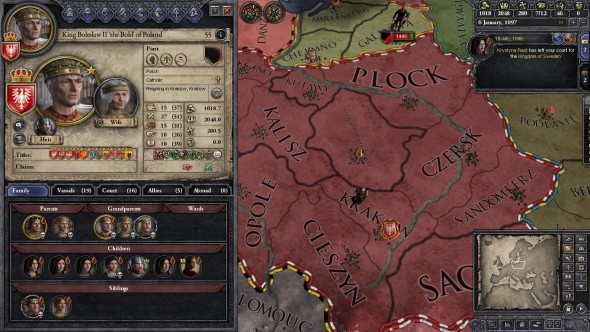

Was everything easier in the past? Crusader Kings II, if it could, would say “I beg to differ.” It is an incredibly demanding Medieval experience, even if it does lack Dragons, Wizards and other Fey creatures. What makes it complex and at times difficult is the stunning AI, the scheming of your Lords (and not only) as well as the problematic (in a good way) Diplomatic system. There are very few games that made me realize that it is possible for the AI to create dastardly schemes to get rid of you (in a way). One such case, among many, was when the brother of my ruler killed all the other heirs by assassination in order to take the throne for himself, but because he quickly became unpopular (he had a terrible character, go figure) his other relatives started a Civil War to dislodge themselves from the kingdom.
That, and much more, you can find in Crusader Kings II, but what should we do in order to keep some control over the happenings in your Kingdom? Read on.

My highly successful ruler. Not only did he bring up a sizable family, but also achieve both Prestige and Piety, not counting his military and financial success.
1. Expand your Capital – It is irrelevant that you are a Count or King, your Capital is what will almost always remain under your family’s control. Sometimes you will hold more territory, but any sons you have could ask you for their own Counties. When that happens you will be left with that one province, and you should invest in it.
A fully upgraded Capital will not only provide you with higher income, but also plenty of troops, compared to your other lords. During a Civil War, Personal War, or Kingdom War your Capital will tip the balance. If you invest your gold into other projects you could find yourself with an empty treasury quickly.
2. “Keep your friends close…” – You might have friends, but it is foolish to think they won’t try something. Naturally, it is less likely they will want to kill you, or start a Civil War, but ignoring them entirely is incredibly risky. You can expect your enemies to attempt all manners of dirty tricks, but at least you know that. There is nothing harsher than a close friend to your family who betrays you (or your own wife, for the matter). On top of that, if you keep an eye on your own Court you will be able to intervene in operations that each of your Lords will try to attempt against each other.
3. Get rid of Rotten Apples – Sometimes, and this is inevitable, you will end up with a rotten family member who will mean only trouble. You could try sending them away to another court, but other times you have to reach for riskier yet certain methods, such as imprisonment or assassination. The last thing you want is a Pretender killing off half your family so that he eventually leads to your kingdom’s downfall. Beware who you choose to act in your Council, since they could abuse their positions.
4. Don’t always be Holy – You could produce Monarchs who are “Holy”, stuffing them with all the possible virtues, but sometimes you need a master of intrigue or war. It is hard to balance Diplomacy, Managment, Knowledge, Intrigue and Combat in such a way that none of the characteristics will be incredibly low. If you fail to have a Monarch with a bit of intrigue he might be an easy target for assassinations, while also have a problem planning any plots of his own.
5. Friends in High Places – When you are a lesser noble, or a King, it pays off to be friends with the Pope and other higher ranking Kings. Good relations with the Pope allow you to sabotage your opponents by excommunicating them, while also protecting your own lords from Excommunication. If the Pope likes you then all the Bishops will also stand by your side, providing your army with more troops. This calls for being a “Holy” Monarch, although taking part in Crusades and acting accordingly during random events could cover up any shortcomings of character.
6. Be Wary of Marriage – Your Family, and especially your Monarch, are not only “people”, but also pawns when you want to form an Alliance with another House. Sending your daughter to marry another Monarch will cement a temporary Alliance which could benefit you during War, but it is a double-edged sword. If by mistake you Ally yourself with a House which is under a constant state of war you could find yourself tied up into an expensive conflict. In turn, if you ignore your Ally’s calls for help your own Prestige will be quickly lost.
7. Be a Family Man – As your family expands you will have to do something about all the children that appear. The simple solution is to send them to different Courtiers, and never be bothered with bringing any of them up. This is risky for one simple reason, you will have no control over how they are brought up. This is especially problematic with your heir, who could end up having a series of penalizing negative traits. When it comes to your oldest sons (sometimes daughters) you will have to bring them up yourself. The alternative is finding them somebody with numerous positive traits you consider important, since these traits will influence how the children are brought up.
8. Use your Council – Only because you wanted to make a few Nobles happy does not mean you should not put them to some use. Each member of your Council can be used to for a passive task which can benefit you in the long-term. Deploy your Spy Master to uncover plots in the Capital, send your Marshall to quell Rebellions, ask your Head Spiritual to improve your standings with local Bishops. If you do not order them to do something, they won’t do anything on their own.
9. Organize a Party! – Your Nobles are sometimes a difficult group to appease. If you lack the Diplomatic abilities you can try organizing Feasts and other events to increase your standing among them. Remember that a Feast will benefit your higher ranking nobles more than the Summer Fair. Your decisions during either one of these events could influence your standing among all the other nobles. In some rare cases, this could even cost you your Monarch’s head.
10. Total War is Expensive – In the event that you declared war, signed up for a Crusade, or are protecting yourself from invasion you have to reach for your treasury to aid you. Mercenaries will often tip the balance so brutally and suddenly that a war which would otherwise last months could end in a matter of weeks. Mercenary groups are often big, with a set of quality troops. The main problem is costs. You do not only have to pay a lump sum to hire them, but you also have to keep on paying them. As such, Mercenaries should be used as a quick boost to your war effort, in order to end a conflict quickly. Relying purely on them will only be possible if you have an incredible income and savings account.
Your other alternative, especially during a Crusade, are Templar Orders. At first they might not be available, but once they appear you will see why they are so powerful. They are incredibly expensive in terms of Piety, but unlike Mercenaries they will not demand regular payment. During a Crusade, or when waging your own Religious War, a Templar Order will tip the balance even harder than any of the Mercenary Groups. The problem is that they refuse to fight other Christians. Hold that in mind when you are about to start a War, and need help.




 Yo-Kai Watch Guide: Side Quest Guide
Yo-Kai Watch Guide: Side Quest Guide 7 Reasons The Phantom Pain may be the best MGS yet
7 Reasons The Phantom Pain may be the best MGS yet Pokemon X & Y Guide: Pokemon in Route 4 - Parterre Way - GamersHeroes
Pokemon X & Y Guide: Pokemon in Route 4 - Parterre Way - GamersHeroes Grand Theft Auto 5 Guide: The Blitz Play Guide
Grand Theft Auto 5 Guide: The Blitz Play Guide Pikmin 3 Guide - Quaggled Mireclops Boss Guide - GamersHeroes
Pikmin 3 Guide - Quaggled Mireclops Boss Guide - GamersHeroes